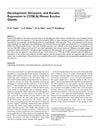 37 citations,
January 1991 in “Reproductive Toxicology”
37 citations,
January 1991 in “Reproductive Toxicology” Finasteride reduces male rat fertility by causing issues with copulatory plug formation.
 28 citations,
January 1991 in “Reproductive Toxicology”
28 citations,
January 1991 in “Reproductive Toxicology” Finasteride temporarily lowers male rat fertility without affecting libido.
 55 citations,
July 2013 in “Dermatologic therapy”
55 citations,
July 2013 in “Dermatologic therapy” Some dermatological medications can impair male fertility, so consult a doctor before trying to conceive.
 18 citations,
October 2017 in “Drug Design Development and Therapy”
18 citations,
October 2017 in “Drug Design Development and Therapy” DA-9401 helps protect rat testis from finasteride damage.
 21 citations,
January 2020 in “General and Comparative Endocrinology”
21 citations,
January 2020 in “General and Comparative Endocrinology” Lack or blocking of SRD5a, a key component in hormone creation, can lead to conditions like pseudohermaphrodism and affect hair growth, bone mass, muscle strength, and reproductive health. More research is needed on its regulation from fertilization to adulthood.
 20 citations,
April 2012 in “Fertility and Sterility”
20 citations,
April 2012 in “Fertility and Sterility” Finasteride causes lasting fertility decrease in rats.
 23 citations,
January 2007 in “Archives of Andrology”
23 citations,
January 2007 in “Archives of Andrology” Finasteride may negatively affect male fertility.
 34 citations,
January 2004 in “Revista do Hospital das Clínicas”
34 citations,
January 2004 in “Revista do Hospital das Clínicas” Finasteride may worsen infertility in men with existing issues, but stopping it can improve sperm health.
 35 citations,
February 1994 in “Fundamental and applied toxicology”
35 citations,
February 1994 in “Fundamental and applied toxicology” High doses of finasteride cause cell growth and tumors in mice.
 3 citations,
January 1994 in “Toxicological Sciences”
3 citations,
January 1994 in “Toxicological Sciences” Finasteride causes abnormal growth in male mice cells at high doses.
 23 citations,
July 1993 in “Pharmacotherapy”
23 citations,
July 1993 in “Pharmacotherapy” Finasteride treats enlarged prostate and baldness, but may cause limited urinary improvement and sex-related side effects.
 18 citations,
June 2002 in “BJUI”
18 citations,
June 2002 in “BJUI” Finasteride doesn't change rat testicle weight or sperm production.
44 citations,
February 2023 in “Cell” Fingerprints form uniquely before birth due to specific genetic pathways and local signals.
 29 citations,
November 2011 in “Veterinary pathology”
29 citations,
November 2011 in “Veterinary pathology” The study found that mouse sweat glands develop before birth, mature after birth, and have specific keratin patterns.
 35 citations,
October 2004 in “Biology of Reproduction”
35 citations,
October 2004 in “Biology of Reproduction” PNU157706 reduced rat sperm movement and fertility without affecting offspring health.
 104 citations,
October 1999 in “The Journal of Urology”
104 citations,
October 1999 in “The Journal of Urology” Finasteride doesn't harm male fertility or sperm quality, but may slightly reduce ejaculate volume.
 58 citations,
March 2013 in “Human Reproduction Update”
58 citations,
March 2013 in “Human Reproduction Update” Products should be called 'sperm-safe' only after thorough, well-designed tests.
36 citations,
March 2014 in “Cell death and differentiation” Disrupting β-catenin signaling in certain cells causes anorectal malformations.
 May 2024 in “Scientific Reports”
May 2024 in “Scientific Reports” Androgen receptors in the mouse brain may explain cognitive and mood changes in prostate cancer treatment.
 14 citations,
July 2021 in “Biomedicines”
14 citations,
July 2021 in “Biomedicines” Platelet-rich treatments can help improve wound healing and tissue repair.
 21 citations,
July 2019 in “Cardiovascular Research”
21 citations,
July 2019 in “Cardiovascular Research” High levels of male hormones in pregnant mice cause heart enlargement and poor heart function in their female babies.
 November 2023 in “International Journal of Infectious Diseases”
November 2023 in “International Journal of Infectious Diseases” A girl with head lice was successfully treated with sulfur ointment and hair shaving.
 February 2023 in “Frontiers in Endocrinology”
February 2023 in “Frontiers in Endocrinology” Too much male hormone in mothers can negatively affect the sexual behavior of both male and female baby mice.
18 citations,
September 1972 in “British Journal of Pharmacology” PCPA induces hypersexual behavior in male rats regardless of age or castration status.
 1 citations,
June 2023 in “Reproduction”
1 citations,
June 2023 in “Reproduction” Microglia, the brain's immune cells, may contribute to Polycystic Ovary Syndrome (PCOS) by altering the female brain's structure and function, with kisspeptin neurons and GABA neurotransmitters also playing a role.
 4 citations,
May 2019 in “Physiology & Behavior”
4 citations,
May 2019 in “Physiology & Behavior” Cocaine impairs male sexual behavior and alters testosterone metabolism in the brain.
 5 citations,
January 2016 in “Asian pacific Journal of Tropical Biomedicine”
5 citations,
January 2016 in “Asian pacific Journal of Tropical Biomedicine” Phthirusa pyrifolia extract may lower testosterone and harm male rat reproduction without damaging the liver or kidneys.
 December 2023 in “The journal of cell biology/The Journal of cell biology”
December 2023 in “The journal of cell biology/The Journal of cell biology” The mTurq2-Col4a1 mouse model shows how the basement membrane develops in live mammals.
 393 citations,
November 2000 in “Archives of General Psychiatry”
393 citations,
November 2000 in “Archives of General Psychiatry” Testosterone is important for men's sexual function, may help some women's sexual desire, while other hormones and neurotransmitters also play complex roles in sexual behavior.
 156 citations,
October 1996 in “Science of The Total Environment”
156 citations,
October 1996 in “Science of The Total Environment” Tributyltin exposure causes sex changes, sterilization, and decline in the snail Ocinebrina aciculata, risking its extinction.



























